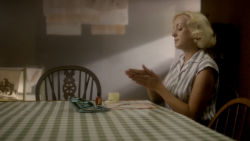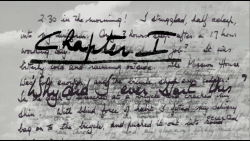by DAVID ROLINSON
Call the Midwife series two episode five Writer: Heidi Thomas; Director: China Moo-Young
 Call the Midwife often makes skilful use of editing to interweave its lead characters with its guest characters. This aids storytelling, heightens our understanding of characters in their social environment and at times even complicates the position of the midwives in that environment. This essay will explore editing and other aspects of form in two sequences from Call the Midwife series two episode five, to explore the ways in which the problems of guest character Nora Harding are interwoven with two lead characters: the first sequence is a well-executed piece of storytelling, whilst the second is an extraordinary use of technique to devastating effect.1
Call the Midwife often makes skilful use of editing to interweave its lead characters with its guest characters. This aids storytelling, heightens our understanding of characters in their social environment and at times even complicates the position of the midwives in that environment. This essay will explore editing and other aspects of form in two sequences from Call the Midwife series two episode five, to explore the ways in which the problems of guest character Nora Harding are interwoven with two lead characters: the first sequence is a well-executed piece of storytelling, whilst the second is an extraordinary use of technique to devastating effect.1
Call the Midwife series two episode five, tx. 17 February 2013. ↩

